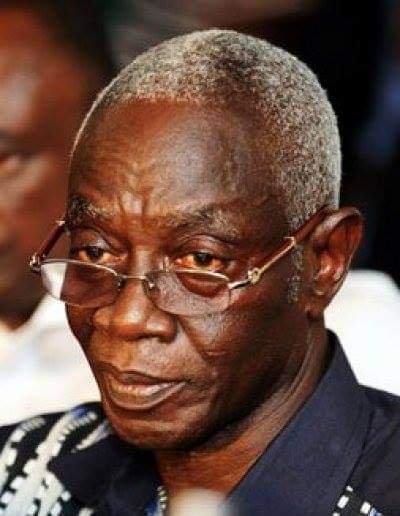News
Return to IPAC; it offers numerous opportunities – Afari Gyan urges NDC

Former Chairman of the Electoral Commission (EC), Dr. Kwadwo Afari Gyan, has urged members of the opposition National Democratic Congress (NDC) to rescind their boycott of the Inter-Party Advisory Committee (IPAC).
The main opposition party withdrew its participation from IPAC after the 2020 general elections, accusing the leadership of the EC of alleged bias in favour of the governing New Patriotic Party (NPP).
The NDC accused the EC of overseeing the manipulation of the 2020 general elections.
While addressing the 3rd Annual Conference of the NDC Lawyers Association in Akosombo in the Eastern Region, Dr. Afari Gyan emphasized the opportunities that IPAC offers to the various political parties.
“The IPAC makes it possible for political parties to know and make inputs to the important thing the Electoral Commission is doing at any point in time. It makes it possible to discuss the concerns of the parties and makes it possible to contribute to the making of subsidiary legislation, and I will appeal to the NDC to go back.”
“Don’t worry if your ideas are not adopted, please go there and make your ideas felt. Indeed, in some cases, IPAC is the forum for stakeholder dialogue towards achieving common ownership of the electoral system. Under Ghana’s Electoral system, there are many opportunities for political parties to participate in Electoral processes that promote free and fair elections,” Dr Afari Gyan advised.
NDC boycotts IPAC meeting on 2020 general elections
The National Democratic Congress (NDC) refused to attend an IPAC meeting scheduled for Wednesday, April 21, 2021.
The meeting was aimed at giving the various political parties the opportunity to review the December 7, 2020, general elections.
“The National Democratic Congress (NDC), declined an invitation by the Electoral Commission of Ghana to attend an IPAC meeting to review the 2020 Parliamentary and Presidential Elections which was scheduled for Wednesday 21st April 2021. The party took this decision because of the lack of candour, odious duplicity, and open bias that was displayed by the Jean Mensah-led Electoral Commission in favour of the New Patriotic Party in the conduct of the 2020 general elections,” the NDC said in a statement.
The NDC, in the statement, justified the action, saying it was to protest the supposed bias displayed by the Electoral Commission during the polls.
“It is the considered view of the NDC, that the current leadership of the Electoral Commission who supervised the manipulation of the 2020 general elections and the stolen verdict that resulted from same, lack the integrity, credibility and impartiality to lead any such discussions or review of the very elections they rigged,” it said.
Credit: Citinewsroom.com
News
Man sentenced to 25 years for robbery at Manso Akwasiso

A 30-year-old man has been sentenced to 25 years imprisonment with hard labour by the Bekwai Circuit Court for his role in a 2022 robbery at a mining site at Manso Akwasiso in the Ashanti South Region.
The convict, Dominic Ofori, also known as Fanta, was arrested on 16th February 2026 after years on the run. He pleaded guilty before the Bekwai Circuit Court to robbery contrary to Section 149 of the Criminal Offences Act, 1960 Act 29, and was accordingly sentenced to 25 years imprisonment with hard labour.
On March 20, 2022, the Manso Adubia District Police received intelligence that a group of armed men from Manso Abodom were planning to attack a mining site at Manso Akwasiso to rob the owner of gold concentrate. Acting on the information, police mounted a coordinated operation and laid an ambush at the site.
At about 5:30 pm the same day, four-armed men arrived at the site, fired indiscriminately, and robbed the miners of their gold concentrate. The police team on surveillance intervened, resulting in an exchange of gunfire.
Three of the suspects, Abu Abubakar, Musah Latif, and Gideon Takyi, sustained gunshot wounds and were pronounced dead on arrival at St Martins Catholic Hospital at Agroyesum. Dominic Ofori escaped at the time but was later arrested and put before the court.
The Ashanti South Regional Police Command has assured the public of its continued commitment to combating violent crimes and bringing offenders to justice.
News
Ashanti police arrest man for publishing false news on TikTok

The Ashanti Regional Police Command has arrested 45-year-old Isaac Boafo, also known as “Duabo King,” for allegedly publishing false news intended to cause fear and panic.
Police said the arrest follows a viral TikTok video in which Boafo claimed that four officers at the Central Police Station in Kumasi engaged in inappropriate conduct with commercial sex workers during night patrols in Asafo.
Officers from the Police Intelligence Directorate (Ashanti Region) apprehended Boafo after receiving intelligence about the video.
During questioning, he admitted to creating the video to attract views and engagement online, and acknowledged that he could not prove the allegations.
Boafo also admitted making comments about the President of the Republic for content purposes and could not defend those statements.
He has been formally charged and is in detention as investigations continue.
The Ashanti Regional Police have warned the public against publishing or sharing false information on social media, noting that such acts can cause fear, panic, and damage reputations.
They said anyone found engaging in similar conduct will face legal action.
By: Jacob Aggrey






